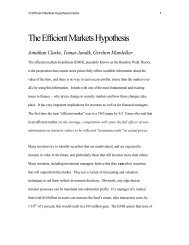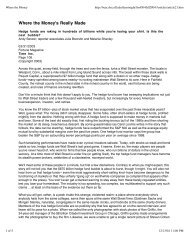Why Can't Most People Buy the All Time High? (PDF) - TurtleTrader
Why Can't Most People Buy the All Time High? (PDF) - TurtleTrader
Why Can't Most People Buy the All Time High? (PDF) - TurtleTrader
Create successful ePaper yourself
Turn your PDF publications into a flip-book with our unique Google optimized e-Paper software.
Jeff wants <strong>the</strong>se feelings to stop, so he turns to system development to bail him out emotionally.<br />
Indeed, system development makes him feel great. He gets to feel productive, goal-oriented, and<br />
hard working. Jeff uses <strong>the</strong> enjoyable feelings he creates by being productive, hitting goals, and<br />
working hard to dislodge and replace his nagging self-doubt and frustration. It is effective. He<br />
feels much better. At <strong>the</strong> same time, he “proves” to himself that he really is a trader by diligently<br />
working on his system. Unfortunately, Jeff is no closer to being able to buy historical breakouts<br />
despite all his hard work and productivity. In fact, Jeff actually degrades <strong>the</strong> robustness of his<br />
trend following method by tinkering with it under <strong>the</strong> false pretense that his difficulty is only<br />
ma<strong>the</strong>matical and not emotional.<br />
Jeff is unwilling to embrace ano<strong>the</strong>r especially critical feeling for trend followers. It is <strong>the</strong> feeling<br />
of missing a major move or regret. Jeff cannot stand to keep DIGL’s symbol on his watch-list or<br />
part of his trading universe. Along with fanning his self-doubt and frustration, DIGL’s presence<br />
gives him a headache and throbbing heartache. These are his untenable somatic feelings of<br />
regret. Jeff cannot stand it.<br />
Jeff squelches <strong>the</strong> growing intensity of <strong>the</strong>se feelings immediately. Eliminate <strong>the</strong> source to stop<br />
<strong>the</strong> feelings. Jeff removes DIGL from his watch list and his system’s stock universe. In turn, his<br />
somatic feelings of regret quickly ebb. He intends to have no clue about how high it may trend.<br />
DIGL’s up-move remains out of sight and out of mind. Knowing anything about it gives rise to<br />
regret, which gives rise to <strong>the</strong> feelings he is unwilling to experience. Unfortunately, Jeff is<br />
unaware of any fur<strong>the</strong>r historical breakout buy signals his trend following system may generate<br />
for DIGL. He carefully protects himself from experiencing regret.<br />
The intensity of a people’s regret seems to run in proportion to how far a move extends from<br />
where <strong>the</strong>y avoid entering. The bigger <strong>the</strong> move, <strong>the</strong> higher <strong>the</strong> intensity of regret and <strong>the</strong> more<br />
unwilling people become to experience it. With some trends, both regret and <strong>the</strong> unwillingness to<br />
experience it can become severe. With severe unwillingness to experience regret, people easily<br />
avoid participating in major trends. Jeff’s unwillingness to experience painful feelings of missing<br />
a major move makes it easy for him to miss DIGL’s major run.<br />
Moreover, Jeff overlooks <strong>the</strong> positive intentions of his uncomfortable feelings. <strong>All</strong> have an<br />
underlying positive purpose. Regret’s positive intention is to remind Jeff what it feels like to<br />
miss a big opportunity. It feels so intensely bad that he wants no part of it. Yet, by being willing<br />
to fully experience it, his feelings of regret transform from enemy to ally. They become<br />
commanding motivation to stick to his simple, trend following system. Look what Jeff must feel<br />
if he fails to execute his system and let a big winning position get away. Suddenly it becomes<br />
much easier for him to stick to his rules. Regret supports only if he is willing to fully feel it.<br />
Self-doubt about winning and being a trader has positive intentions. It keeps Jeff honest with<br />
himself. It injects a helpful dose of cold reality and personal responsibility if he becomes willing<br />
to fully experience it. Self-doubt raises tough and pointed questions. Does he really want to win<br />
Is he really a trader Jumping his system signals is surely not <strong>the</strong> way to answer a confident<br />
“yes” to ei<strong>the</strong>r of <strong>the</strong>se questions. If he does not think he can win or be a trader, self-doubt leads<br />
him to ano<strong>the</strong>r critical question: what stands in his way and inhibits him It may lead him to look<br />
inward if he becomes willing to fully experience it. Conversely, it may lead him away from<br />
trading and to his real right livelihood if his honest answer is “no.”<br />
The positive intention of Jeff’s frustration is to motivate him to change his system jumping<br />
behavior at historical breakouts. Jeff’s system says to do one thing while he does ano<strong>the</strong>r. If Jeff<br />
8




